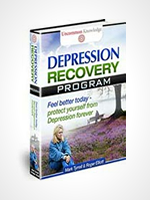Using The Cycle of Depression
Depression affects not only how we think, but also our immune system, our sleep patterns and the natural processes the body and mind use to stay in good physical and mental order.
The cycle of depression explains all the symptoms and signs of depression, and gives us an effective strategy for overcoming depression.
To beat depression for good, we have to break the cycle in as many places as possible, and stop it from re-forming.
As depression progresses, we get locked into a trance-like state - as we become emotionally aroused with negative emotions, our brain treats this arousal as a traditional 'threat' and reverts more to ' All or Nothing thinking' reducing our possible outcomes even further.
- The more emotionally-arousing, negative thinking we do, the more we dream.
- As the excessive dreaming causes more REM sleep, meaning less deep sleep, we become exhausted.
- The more exhausted we are the more we are likely to interpret reality in depressing ways.
- The cycle continues by finally affecting our immune systems, and periods of repair and re-growth we undergo in deep sleep, affecting our health, which can only add to depression.
So it's clear to see what are commonly given as causes of depression, may well be triggers, but fail to give us the complete picture. Only when we understand the connection between depressive thinking styles, emotional arousal, dreaming and exhaustion does the true essence of depression become clear.
From this understanding we can clearly understand the physical effects of depression, why they happen and how to prevent them...







